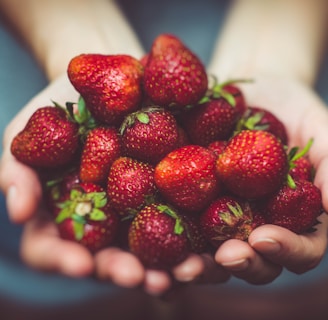10 Natural Foods that Help Cleanse Your Colon
Promote your colon health and better digestion! Discover 10 fiber- and nutrient-rich foods that act as a natural broom for your digestive system.
HEALTHBLOG-LIST
Narcisse Bosso
10/19/20254 min read


The colon, or large intestine, plays an essential role in eliminating waste and toxins. For it to function optimally, it needs a constant supply of fiber and water. Rather than resorting to aggressive cleansing methods, the healthiest and most effective approach is to integrate specific foods into your diet. This article presents 10 superfoods that naturally support and "cleanse" your colon, promoting better regularity and optimal digestive health.
Table of Contents
I. Fiber-Rich Fruits and Seeds (The Bulk Providers)
Apples and Pears
Berries
Flaxseeds
II. High-Fiber & Prebiotic Vegetables (The Nourishers) 4. Legumes (Lentils, Chickpeas, Beans) 5. Dark Green Leafy Vegetables 6. Broccoli and Cauliflower 7. Garlic and Onion
III. Grains and Fermented Foods (The Regulators) 8. Oats (Oatmeal) 9. Kefir and Probiotic Yogurt
IV. The Essential Element 10. Water and Herbal Teas
1. Fiber-Rich Fruits and Seeds (The Bulk Providers)
1. Apples and Pears These fruits are excellent sources of pectin, a soluble fiber. Pectin turns into a gel-like substance in the digestive tract, helping both to soften stool and to bind waste to facilitate its transit and elimination. Furthermore, their high water content contributes to maintaining colon hydration.
2. Berries (Raspberries, Blackberries, Strawberries) Berries are exceptionally rich in antioxidants, but also in fiber (especially raspberries and blackberries, which are among the richest in fiber). Their small seeds act as a gentle "broom" in the colon, helping to dislodge particles and promote regularity.
3. Flaxseeds Flaxseeds are a superfood for gut health. They contain both soluble and insoluble fiber, as well as omega-3s. Once hydrated, they form a mucilage that increases stool bulk and facilitates its movement through the colon. They are extremely effective in fighting constipation.
2. High-Fiber & Prebiotic Vegetables (The Nourishers)
4. Legumes (Lentils, Chickpeas, Beans) Legumes are incredibly rich in fiber—both soluble and insoluble—and resistant starch. They promote the production of Short-Chain Fatty Acids (SCFAs) by the good bacteria in your colon, which nourishes the colon cells and reduces inflammation.
5. Dark Green Leafy Vegetables (Spinach, Kale) These vegetables are not only rich in vitamins (A, C, K), but also in chlorophyll. Chlorophyll can help neutralize toxins and acts as a natural deodorizing agent in the intestine. Their high fiber content also helps speed up transit.
6. Broccoli and Cauliflower These cruciferous vegetables contain sulfur compounds that support liver detoxification. They are also rich in insoluble fiber, which adds volume to stool and speeds up its elimination from the colon.
7. Garlic and Onion These foods are rich in prebiotics, notably inulin and fructans. Prebiotics are not digested by the small intestine but serve as food for the good bacteria (probiotics) in the colon, fostering a balanced gut microbiota and a healthy intestinal environment.
3. Grains and Fermented Foods (The Regulators)
8. Oats (Oatmeal) Oats are a major source of beta-glucans, a type of soluble fiber. Beta-glucans support a healthy intestinal microbiota and help form soft, voluminous stools that move easily through the colon. It's an excellent choice for breakfast.
9. Kefir and Probiotic Yogurt Fermented foods like kefir (fermented milk) and yogurt contain probiotics (live beneficial bacteria). A regular intake of probiotics helps restore the balance of the gut flora, prevent the growth of bad bacteria, and optimize colon function.
4. The Essential Element
10. Water and Herbal Teas Technically, they are not foods, but hydration is the most critical factor for a clean colon. Without enough water, fiber cannot swell and perform its function, which can lead to constipation. Drink plain water, infused water, and herbal teas (chamomile, peppermint) throughout the day to keep things moving.
Frequently Asked Questions (FAQ)
Q: Is a colon cleanse necessary for colon health? A: For most people, aggressive commercial colon cleanses are not necessary. A healthy colon naturally cleanses itself. The best and safest "cleanse" is a diet rich in high-fiber foods and sufficient hydration, as detailed in this article.
Q: How quickly will I notice the effects of adding these foods to my diet? A: Changes in regularity and digestion can often be noticed within a few days to a week of consistently increasing your fiber and water intake. However, for deeper benefits to your microbiota and colon cell health, allow several weeks to months.
Q: Can too much fiber be harmful? A: Yes, adding a large amount of fiber too quickly can cause bloating, gas, and discomfort. It is recommended to increase fiber intake gradually and simultaneously increase your water consumption to help the fiber pass smoothly.
Q: What is the difference between prebiotics and probiotics? A: Prebiotics (found in foods like garlic and onion) are the non-digestible fiber that feeds the beneficial bacteria. Probiotics (found in yogurt and kefir) are the live beneficial bacteria themselves. Both are essential for a healthy gut ecosystem.
Conclusion
The best way to "cleanse" your colon is to provide it with what it needs to function naturally: fiber in abundance, probiotics for balance, and plenty of water. By integrating these 10 foods into your daily diet, you support your body's natural ability to eliminate waste, which is essential for optimal digestive health and well-being.
Authentic Scientific Sources:
INSERM (National Institute of Health and Medical Research): Reports on the impact of dietary fiber on intestinal transit and the prevention of colon diseases.
Société Française de Nutrition (SFN - French Nutrition Society): Recommendations concerning fiber intake and microbiota health.
Ameli.fr (Health Insurance - France): Information on the causes and prevention of constipation and the importance of diet.
Written by Narcisse Bosso, certified naturopath. His lifelong passion for health became a profound vocation after the passing of a loved one due to an illness that could have been avoided with simple changes in habits and lifestyle.
